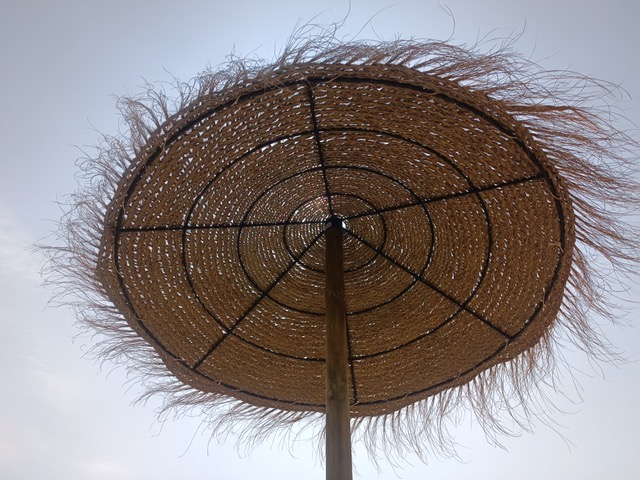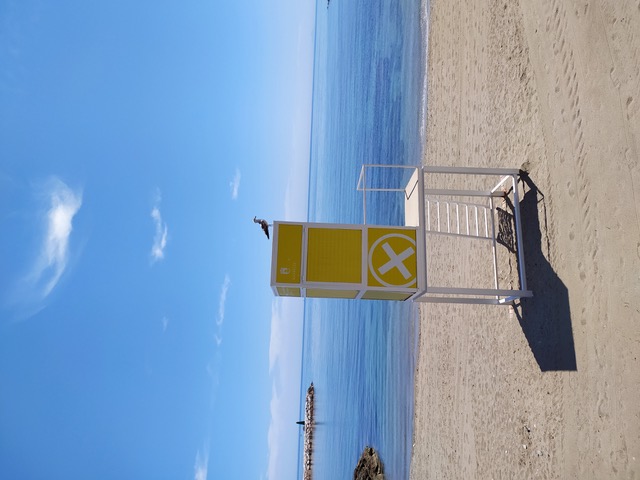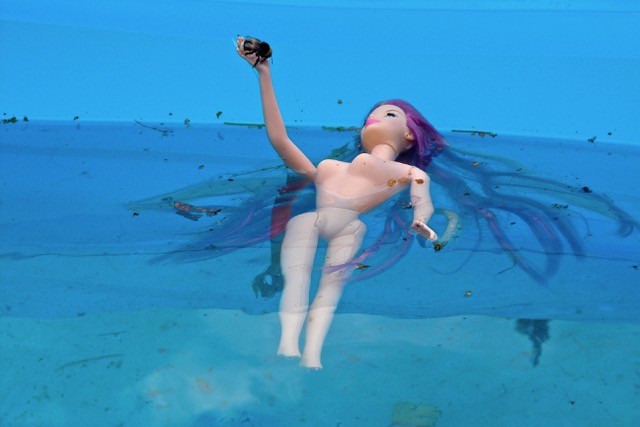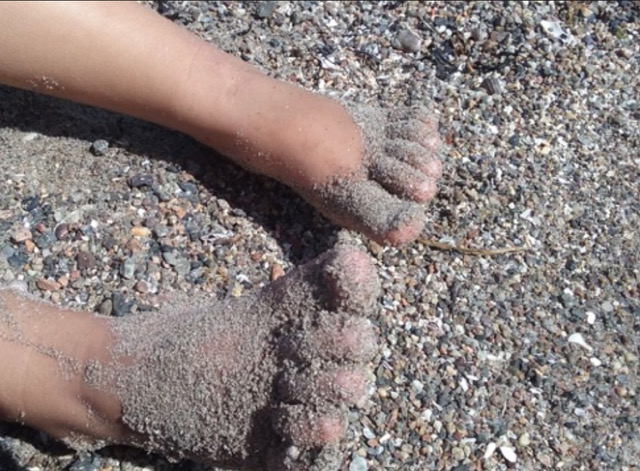
Parasol. Photo © Karethe Linaae
It is not only the Spanish real estate market that was competitive this summer. It also applies to every square meter of sandy beach on Costa del Sol and other parts of the Spanish coastline. Unlike the real estate market, however, public beach spaces are not for sale but intended for general use. This means that if you want to find a space to lay down your towel, you must get to the beach as early as possible. For this reason, some beachgoers will try to ‘reserve’ a space for later by leaving for instance their parasol, something local police have been trying to combat. Welcome to the Big Parasol War of 2024!
The early bird gets the worm

The early bird gets the worm. Photo © Karethe Linaae
The beach race happens every summer when bathers compete against sun lovers in the battle to get the best spot in the sand. Some head down to the beach just after sunrise with a deck chair or an umbrella, so they can place their item and hold the spot with the optimal tanning potential and the fairest ocean views. Of course, they do not want to sit there moping all alone in the early morning hours, so they go home to eat breakfast, shop, or do chores. Only when the sun is high in the sky do they stroll back to settle down on their 'reserved' piece of beach real estate.
But when they get to the playa which is now overcrowded with people, they discover that their stuff is gone. Is it stolen? they perhaps ask themselves. Some other beachgoers might inform them (slightly maliciously ...) that the police were there to remove their abandoned belongings. Our indignant beachgoer who hijacked the spot in the early morning has not only lost his or her reserved space but must collect their belongings from a police warehouse. And on top of it all, they will have to pay a fine.
Reserving beach spaces for later has always happened and is as common as when people grab a seat at the cinema and then go back out to the long popcorn queue. The only problem is that with today's mass tourism and overcrowded beaches, there is no longer room for everyone - at least not enough room for everyone to reserve a place and then go for lunch for several hours while, in their absence, their towel serves as a placeholder for their valuables seat in the sand.
Since this type of possessiveness is getting worse, local police in certain towns have started to remove towels, parasols, and other possessions that are left for hours. This summer, La Guerra de las Sombrillas (The Parasol War) caused several municipalities on the Costa del Sol to create regulations prohibiting 'space reservation' on public beaches. In 2015, Algarrobo was the first Málaga-municipality to introduce a ban on this unwanted practice, and several other Costa del Sol municipalities have also joined the crusade.
Municipalities take action

Swimming beauty. Photo © Karethe Linaae
One coastal municipality has introduced fines of up to 300 euros for beachgoers who reserve a space and then disappear for several hours. According to the town hall, sanctions have been implemented by the local police to eliminate this "uncivilized behavior", which otherwise is classified as a minor offense. What the municipality tries to discourage is particularly users who arrive at the beach at 07.00 in the morning and reserve a front-row ocean spot and then do not show up to use it until late in the afternoon. The town hall’s reasoning is simple - they want both locals and visitors to enjoy their beaches without having abandoned chairs, umbrellas, and tables in front of them for hours.
The regulations do not mean that beachgoers cannot go and buy food at a chiringuito, go for a walk, or take a dip in the sea without being fined. Allegedly, the police officers always ensure that the space has been empty for several hours before they remove abandoned property. They also usually leave a message for the owners about where they can pick up their confiscated beach gear and take pictures of the belongings before removing them.
The regulations specify that the seized objects will be stored for a maximum of fourteen days before they are destroyed (one coastal municipality is now considering whether unclaimed objects can be donated to charity instead of being discarded). The fine, which must be paid before the fortnight deadline, is a minimum of 30 euros. According to coastal media, the local population has applauded the measure, as many cannot believe that there are people who want to exploit a public sanctuary in such a manner.
Other antisocial beach practices:
The squatters

My interpretation of Miro - space invasion. Photo © Karethe Linaae
It is not only the Space Hoggers who create a bad atmosphere on Costa del Sol's beaches. Just take what I call the Squatters. These are the families that come with the entire clan, from great-grandmothers to the youngest grandchild. The tribe carries with them seemingly all their earthly belongings, which may or may not include: chairs, tables, coolers the size of small sarcophagi, tents and tarps for extra shade, a playpen, pram, and Ikea baby tent, giant inflatable toys, swimming rings and swimming wings, frisbees, footballs and beachballs, chess boards and surfboards, sun hats, sunscreens, and change of bathing suits, plastic buckets, shovels and ready-made plastic beach castles, sun spray, mosquito spray, and jellyfish spray as well as a manly barbecue and enough food to feed a small army. In extreme cases, they will also bring with them a party tent (estimated 30 m2) which they install, walls and all, though I must admit that I have only observed this once. It should also be added that the squatters rarely leave their siege site at the same time. There is always a distant cousin who stands guard while the rest go home to shower and come back in the early evening.
The space invaders

Feet in the sand. Photo © Karethe Linaae
The space invader is yet again a type that is not only known to frequent beaches but all public spaces, such as park benches. Let's say you get down to the water early. There is plenty of room so you can lie down to enjoy the beach in near solitary bliss. Life is good. Then you hear voices and see a couple beelining straight towards you. They have the entire beach to choose from and plenty of open space, yet they choose to lay their stuff right next to your peaceful paradise. It does not help to hint that there is a lot of space to choose from. Neither will you alter their plan of action if you suggest that perhaps they could move a little further away. It's not because they want to be near you. They just want the exact spot you are in, and nothing can make them change their mind.
Both the squatters and the space invaders are not breaking any laws as such, just social customs and common courtesy. But many other beach activities are illegal, especially commercial ones. This applies for example to the sale of towels and sunglasses on the beach, unregistered rental of beach umbrellas to tourists, uncontrolled sales of food and drink (like the people who go around selling Mai Tais from coolers without any kind of hygiene control), and perhaps the most unpalatable of all - people walking around in the heat offering 'professional' beach massages without any health precautions. In addition, certain prohibitions apply to the activities performed by the beachgoers themselves, such as playing loud music, peeing in the water (how in heaven’s name they can patrol that, I have no idea!), and, as mentioned above, space reservations.
With tens of thousands of people on the Costa del Sol's beaches on a busy summer day, there is no wonder local authorities have chosen to crack down on illegal activities. But not all see banning space reservations in the same red light. The topic became one of the summer's favorite themes on social media where both supporters and opponents posted their photos and videos, often with thousands of comments. A certain TikToker complained that the police actions were excessive and far too controlling compared to what is being done to other lawbreakers. Does it make sense, they asked, that the police can remove the belongings of beachgoers who may be spending an extra-long lunch at a chiringuito nearby, while people who occupy somebody else’s house for months and years are protected by Spanish law?
They got a point there ...

Place saver. Photo © Karethe Linaae